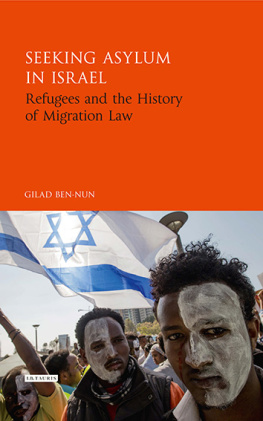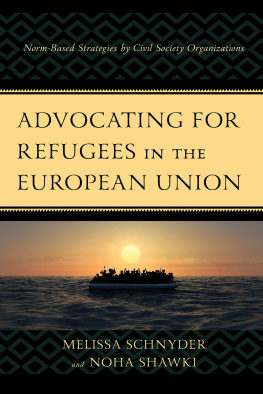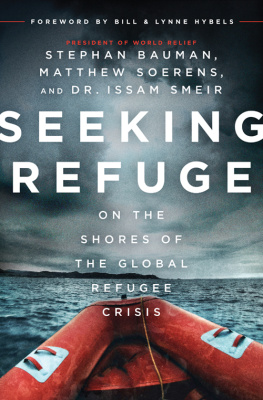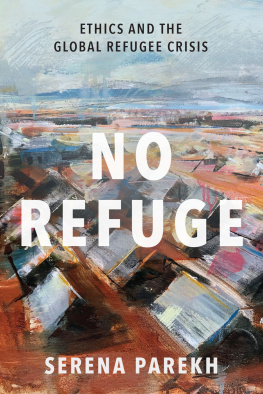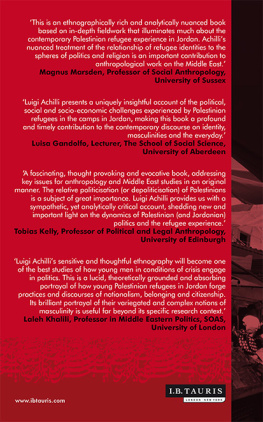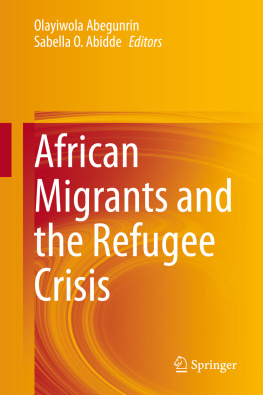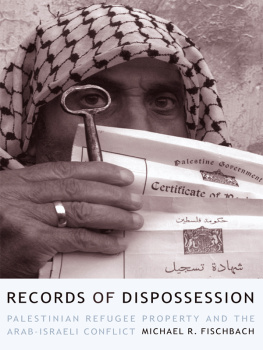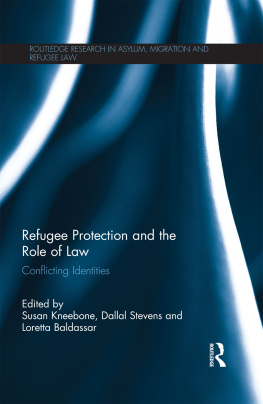
Gilad Ben-Nun is Marie Curie Individual Fellow at Verona University's Department of Public International Law and holds a PhD from the University of Leipzig. He is also the author of The Fourth Geneva Convention: The History of International Humanitarian Law (I.B.Tauris, forthcoming).
Fascinating, even gripping [the book] sheds rare light onto the drafting process of the most important treaty on refugees.
Pierre Hazan, Special Advisor on Transitional Justice, Centre for Humanitarian Dialogue (Geneva) and Associate Professor, Neuchtel University
No moment could be more appropriate for tackling this topic than today, when all of Europe, inside and outside of the EU, and the Mediterranean region, are helpless and in disarray facing the refugee crisis. Gilad Ben-Nun dares a twin-track strategy of making us aware about the section of international law that has become so critical after World War II and the period of decolonization, and the role the young state of Israel played in writing and commenting this law: that is one track. The other is the application of international and national law on refugees to Israel. The second track can be observed as a paradigmatic oscillation between universalism i.e. also a global commitment to conventions and rules of supranational law and a fall-back into old and new nationalisms This book is pioneering in several ways.
Michael Daxner, Professor, Freie Universitt Berlin and former Principal International Officer, United Nations Interim Administration Mission in Kosovo (UNMIK)
This book demonstrates convincingly that knowing about global history is essential for understanding current international events. By analyzing the conflict between judges and government in Israel concerning the treatment of refugees, the author has made visible the deep roots of todays migration policies.
Matthias Middell, Professor of Global History, University of Leipzig
SEEKING
ASYLUM IN
ISRAEL
Refugees and the History of Migration Law
G ILAD B EN- N UN

Published in 2017 by
I.B.Tauris & Co. Ltd
London New York
www.ibtauris.com
Copyright 2017 Gilad Ben-Nun
The right of Gilad Ben-Nun to be identified as the author of this work has been asserted by the author in accordance with the Copyright, Designs and Patents Act 1988.
All rights reserved. Except for brief quotations in a review, this book, or any part thereof, may not be reproduced, stored in or introduced into a retrieval system, or transmitted, in any form or by any means, electronic, mechanical, photocopying, recording or otherwise, without the prior written permission of the publisher.
Every attempt has been made to gain permission for the use of the images in this book. Any omissions will be rectified in future editions.
References to websites were correct at the time of writing.
Library of Modern Middle East Studies 193
ISBN: 978 1 78453 760 9
eISBN: 978 1 78672 133 4
ePDF: 978 1 78673 133 3
A full CIP record for this book is available from the British Library
A full CIP record is available from the Library of Congress
Library of Congress Catalog Card Number: available
To Keren:

Maimonides, Commentary on the Mishna, Avot A. 6.
CONTENTS
LIST OF ILLUSTRATIONS
Map
Main East African migrant route to Israel
Graph
Working permits issued to non-Jewish residents in Israel, 200012
ACKNOWLEDGEMENTS
The origins of my interest in forced migration stem from personal circumstances. My father was born in Morocco to a religious Jewish family whose origins trace back to the exiled Jews of Spain. The Banon family, originally from a village carrying that name some 60 km south of Zaragoza, received asylum in Morocco a Muslim welcome which lasted four-and-a-half centuries, as they first settled in Marrakesh, and later moved south to the region of Agadir and Tiznit. My mothers family were Lithuanian Jews, who fled to South Africa in early twentieth century after experiencing anti-Jewish riots during the rise of East-European nationalism. I was born in Jerusalem, to where my parents Jews born on the opposite ends of the African continent emigrated to. My father-in-law was born in Israel to a German-speaking Jewish family who fled Nazi Berlin in the late 1930s. My mother-in-law was born in Alexandria to Jews originally also from Spain. She was exiled from Egypt after the ousting of Egypts Jews by Gamal Abdel Nasser.
My first direct contact with non-Jewish exile was that of Palestinian refugees, during my years of service in military intelligence and work in East Jerusalems security sector during the Oslo years. My empathy towards Palestinian refugees grew during my years in Peace Now and later in the UN. From 2008 onwards one gradually began to see more and more black African migrants arrive in Israel. By 2011, this initial trickling of Africans had become a mass influx. I could now see a refugee crisis happening in real time, and not just hear about it and meet its descendants post eventum. Most importantly, I witnessed first-hand the visceral societal reactions which this influx of foreign refugees generated in a host society. I thus went searching for a doctoral program which would provide a sound academic housing and a nourishing intellectual environment to ponder this societal reaction. I found this stimulating environment and more in Leipzig.
Ever since I unassumingly knocked on his door, Matthias Middell the Director of Leipzig Universitys Global and European Studies Institute (GESI) and its Centre for Area Studies (CAS) has been a mentor and friend. His counsel on the need to break the boundaries of traditional academic disciplines in the study of a multi-faceted field such as forced migration, has rendered a new meaning to my understanding of what Global Studies is all about. At GESI, Martina Keilbachs wisdom and advice were of special importance, and Stefan Troebst provided much needed guidance. Over the past four years, I have had the privilege of teaching at the joint MA and PHD program in Global Studies of Leipzig University and Addis Ababa Universitys Institute for Peace and Security Studies (IPSS). Significant segments of this book were written during my extensive stays in Addis at IPSS. I owe a special debt to Ulf Engel for his friendship and unparalleled knowledge of Africa, for privileging me with this experience of being close to my students from the African continent, and for reading and commenting on the entire manuscript.
I was blessed to have received the generous support of the Ernst Ludwig Ehrlich Foundation (ELES) who shouldered, both financially and thematically, this entire project from its outset. Special thanks to Eva Lezzi and Dimitry Belkin. Michael Daxner has had a special impact on this book, thanks to the hours he accorded me - picking his brain and vast experience, both as an academic and as a former senior UN diplomat.
Looking back, I understand the impact which my years at the UN and living in Geneva have had on my life. Pierre Hazan has had a profound influence on this book, on its engagement with issues of Universalism and Exceptionalism, and more generally on my intellectual development over the past fifteen years. I owe him a lot, and this is a good venue to mention it. In Geneva, I owe a special debt of gratitude to Jasna, Roland and Emmanuelle. In addition to the portions of this book written in Leipzig, and Addis, many ideas were shaped during discussions on the kitchen table in Jussy, and over coffee tables in Meinier and Cologny.
Next page
